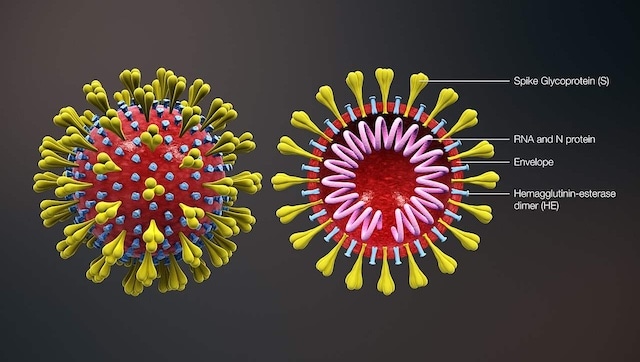
The study authors also said that drugs targeting endothelial activation should be used to control inflammation and coagulopathy associated with COVID-19

The structure and cross-sectional view of Human Coronavirus. It shows depicting the shape of coronavirus as well as the cross-sectional view. Image shows the major elements including the Spike S protein, HE protein, viral envelope, and helical RNA. Image credit: Wikipedia
is primarily a respiratory disease that spreads through droplets. The causing , SARS-CoV-2, enters the body through the mouth or nose and uses the ACE2 receptors present on the surface of host cells to infect these cells. Since the virus mainly infects the lungs and airway, patients may suffer from lung damage, inflammation of the endothelium (inner surface of blood vessels) and organ dysfunction.
The patients also show increased blood coagulation and the formation of tiny blood clots in the body. However, so far it was not known whether the SARS-CoV-2 actually dysregulates vascular function.
Now, a group of researchers at the Stony Brook University, US, state that endothelial cells don’t have ACE2 receptors and hence SARS-CoV-2 does not infect these cells directly. However, since endothelial damage is seen in patients, the authors suggest that the virus is indirectly affecting endothelial cells. The findings of the study are published in the peer-reviewed journal mbio.
Indirect infection of endothelial cells
For the study, the researchers examined SARS-CoV-2 infection in the endothelial cells (ECs) obtained from the lungs, kidneys, heart, brain and umbilical veins. It was found that the virus did not infect any of the tested ECs.
Next, the researcher team introduced the gene for ACE2 in ECs and exposed them to SARS-CoV-2. This time a viral titre between 1 and 3 X 107 was found in these cells, indicating that the cells were infected by the this time. Additionally, the study authors suggested that while ECs don’t express ACE2 receptors, they do express some proteases that SARS-CoV-2 uses to dysregulate endothelial function. Also, the virus may be infecting a small number of endothelial cells, causing inflammation and damage.
“Our research revealed that endothelial cells lack ACE2 receptors and that endothelial cells were only SARS-CoV-2 infected after expressing ACE2 receptors in them. Since endothelial cell functions are dysregulated by SARS-CoV-2, these findings suggest a novel mechanism of regulation that does not require viral infection. Instead, it suggests the indirect activation of the endothelium, potentially resulting from surrounding tissue damage, that could be the basis for further research to therapeutically target and restore normal endothelial cell responses,” said Dr Erich Mackow, lead author of the study in a news release by Stony Brook University.
Targeting the endothelial cells
Because the endothelial cells are not actually infected by SARS-CoV-2, drug therapies against the infection would be useless in the treatment of endothelial inflammation in patients. Instead, the study authors say that drugs targeting endothelial activation should be used to control inflammation and coagulopathy associated with .
As per the news release, the research team at Stony Brook is now planning to study how SARS-CoV-2 or -infected lung cells activate ECs.
For more information, read our article on Why affects the lungs.
Health articles in Firstpost are written by myUpchar.com, India’s first and biggest resource for verified medical information. At myUpchar, researchers and journalists work with doctors to bring you information on all things health.